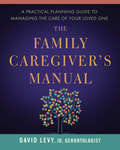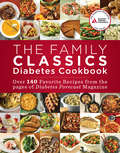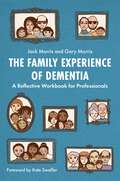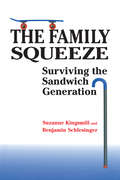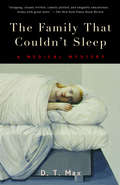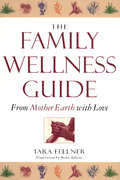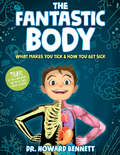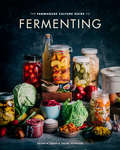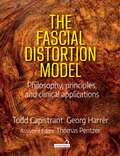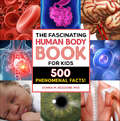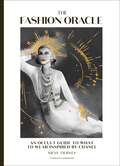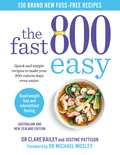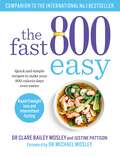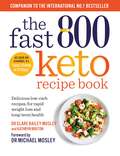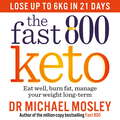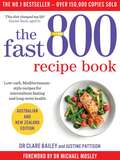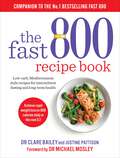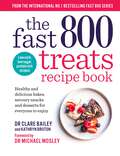- Table View
- List View
The Family Caregiver's Manual: A Practical Planning Guide to Managing the Care of Your Loved One
by David LevyFamily caregiving expert David Levy sets forth how to evaluate priorities, understand options, and face bedrock issues (legal, financial, emotional, social), so caregivers can make wise and informed decisions for their loved ones, while gaining peace of mind from knowing they did the best they could under the circumstances.Drawing from over twenty-five years of experience, Levy provides caregivers with a model for effective planning and problem-solving, focusing on the nonclinical aspects of caregiving, which are often neglected by medical professionals: Caring for young and old victims of disability, illness, and chronic disorders Finding ways to make our healthcare system work Assembling core information about a loved one's life Developing a realistic view of how much care a loved one needs today and may need tomorrow, and understanding that continuum of care Locating resources that can make a difference in making sure a loved one's care-needs are met Finding a good family caregiver support group Overcoming the roadblocks the caregiver's feelings of distress and failure can create Taking a practical approach to that overused phrase "Take care of yourself." David Levy, JD is a gerontologist and a recognized family caregiver expert. Levy holds a Doctor of Jurisprudence and is a Florida Supreme Court Certified Family Mediator in family caregiving and a certified Family Conflict Dynamics Profiler. He facilitates weekly family caregiver support groups and counsels family caregivers, both pro bono and privately.
The Family Classics Diabetes Cookbook
by ADA American Diabetes AssociationThe Family Classics Diabetes Cookbook is a collection of the best 150 recipes from the American Diabetes Association's Diabetes Forecast magazine, now collected into one convenient, gorgeous edition.The recipes are simple, quick, and filled with fresh ingredients. Many have been developed by Robyn Webb, a well-known and award-winning nutritionist who has written many other American Diabetes Association cookbooks, including the bestselling Diabetic Meals in 30 Minutes-Or Less! and American Diabetes Association The Diabetes Comfort Food Cookbook. All of the recipes meet the American Diabetes Association's nutrition guidelines, ensuring that they're a perfect match for nearly any diabetes meal plan. In addition, every recipe has complete nutrition information and diabetic exchanges.Also included is a "How To" section that teaches some of the basics of cooking. Recipes contain "Simple Tips," which give readers ideas about how to keep things easy in the kitchen while still bringing exceptional taste to the table.Recipes include: Cajun Spiced Pork Tenderloin, Filet Mignon with Red Wine, Roast Beef with Horseradish Sauce, Pappardelle with Pesto, Pasta with Roasted Asparagus, Stir-Fried Shrimp with Snow Peas, Chicken Pot Pie with Phyllo, Biscuit and Hamburger Pie, and more.
The Family Cooks: 100+ Recipes to Get Your Family Craving Food That's Simple, Tasty, and Incredibl y Good for You
by Laurie DavidFor families, eating right has become a monumental challenge. Cultural messages convince us that we no longer have time to cook, and food marketers spend billions persuading us that packaged, processed food is convenient, satisfying . . . and the key to happiness. Half of all our meals are now eaten outside the home. The result? Skyrocketing rates of heart disease and diabetes and unprecedented levels of childhood obesity. This crisis is movingly portrayed in author and activist Laurie David's new documentary (coexecutive produced with Katie Couric), Fed Up! Luckily, we have a solution: Studies have clearly shown that eating home-cooked meals reduces obesity and develops lifelong healthy eating habits. There is an exciting movement afoot that involves a skillet, a few good knives, and some fresh ingredients: Home cooking is making a comeback. In The Family Cooks, David inspires parents and kids to take control of what they eat by making it themselves. With her longtime collaborator, Kirstin Uhrenholdt, David offers more than 100 recipes that are simple, fast, "low in the bad stuff and high in the good stuff," and designed to bring kids into the cooking process. The authors also demystify cooking terms and break down basic prep techniques, creating stress-free meals that foster health, togetherness, and happy palates. The Family Cooks is the ideal companion for unseasoned chefs of all stripes, whether they're parenting or being parented.
The Family Experience of Dementia: A Reflective Workbook for Professionals
by Gary Morris Jack MorrisDementia not only affects the person presented with the diagnosis, but their family and friends too. This book provides practitioners with strategies to support the whole family and understand their dementia journey both pre- and post-diagnosis. This is facilitated through a series of activities and reflective prompts. There is also a dedicated chapter offering structured exercises for health and social care practitioners and students. The book introduces the Lawrence family, where Peter has been diagnosed with dementia, and provides perspectives from each family member, allowing practitioners to become acquainted with the lived experience of everyone involved. The reflective questions allow readers to become actively engaged to maximise their knowledge and understanding, and to better contextualize what the dementia experience feels like for family and friends. With its focus on the all-important lived experience of the whole family during the diagnostic process and beyond, this is essential reading for any practitioner working with people with dementia.
The Family Guide to Aromatherapy: A Safe Approach to Essential Oils for the Holistic Home
by Erika GalentinMix up a happier home with aromatherapy recipes for the whole family. Full and busy households are a beautiful thing, but they can also create stress and chaos. The Family Guide to Aromatherapy is a complete, family-friendly reference for using essential oils at home to promote wellness and harmony. With safety at the forefront, this book teaches you how to use aromatherapy to benefit the whole family. Learn how to mix and properly dilute the right oils to help ease everything from acne and anxiety to indigestion and insomnia. The whole family can make blends to help with things like mood and confidence, and even make their own shampoo—with safe ingredients for all ages. The Family Guide to Aromatherapy offers: The real scoop—Learn the joy and benefits of essential oils, along with their honest limitations and potential risks. Aromatherapy for every life stage—Hundreds of recipes are sorted by age group, from prenatal to seniors. Safety first—Each chapter begins with watch-outs for the associated ages, and charts explaining which essential oils are safe, which to use in moderation, and which to avoid altogether. Handy references—You'll find pages to write notes, and a glossary of 30 common essential oils and their properties. Use aromatherapy to create a peaceful, pleasant, and safe environment for everyone.
The Family Squeeze
by Benjamin Schlesinger Suzanne KingsmillThe Sandwich Generation refers to the growing numbers of middle-aged people who must care for both children and elderly parents while trying to manage the stress of full-time jobs. Advances in technology and medicine are helping us to live longer - but not without extended care from our families. At the same time, the economic climate is making it difficult for young adults to leave home and start their own lives; they are often 'boomeranged' back to their parents for financial help, emotional support, and accommodation. In The Family Squeeze, Suzanne Kingsmill and Ben Schlesinger trace the day-to-day life of a typical family caught up in this situation. They guide the reader through various scenarios, paying particular attention to the 'woman in the middle,' who has traditionally been the caregiver to young and old but is now also a full-time member of the workforce. Each scenario is followed by comments, advice, and suggestions that will help the reader understand each stage of the game. The resource section includes an extensive annotated bibliography, as well as a list of selected services in Canada and the United States. Internet resources are also listed.Any person who is, or about to become, a member of the Sandwich Generation will find this a helpful guide for coping with the conflicting demands of family and work.
The Family That Couldn't Sleep: A Medical Mystery
by D. T. MaxFor two hundred years a noble Venetian family has suffered from an inherited disease that strikes their members in middle age, stealing their sleep, eating holes in their brains, and ending their lives in a matter of months. In Papua New Guinea, a primitive tribe is nearly obliterated by a sickness whose chief symptom is uncontrollable laughter. Across Europe, millions of sheep rub their fleeces raw before collapsing. In England, cows attack their owners in the milking parlors, while in the American West, thousands of deer starve to death in fields full of grass. What these strange conditions–including fatal familial insomnia, kuru, scrapie, and mad cow disease–share is their cause: prions. Prions are ordinary proteins that sometimes go wrong, resulting in neurological illnesses that are always fatal. Even more mysterious and frightening, prions are almost impossible to destroy because they are not alive and have no DNA–and the diseases they bring are now spreading around the world. In The Family That Couldn’t Sleep, essayist and journalist D. T. Max tells the spellbinding story of the prion’s hidden past and deadly future. Through exclusive interviews and original archival research, Max explains this story’s connection to human greed and ambition–from the Prussian chemist Justus von Liebig, who made cattle meatier by feeding them the flesh of other cows, to New Guinean natives whose custom of eating the brains of the dead nearly wiped them out. The biologists who have investigated these afflictions are just as extraordinary–for example, Daniel Carleton Gajdusek, a self-described “pedagogic pedophiliac pediatrician” who cracked kuru and won the Nobel Prize, and another Nobel winner, Stanley Prusiner, a driven, feared self-promoter who identified the key protein that revolutionized prion study. With remarkable precision, grace, and sympathy, Max–who himself suffers from an inherited neurological illness–explores maladies that have tormented humanity for centuries and gives reason to hope that someday cures will be found. And he eloquently demonstrates that in our relationship to nature and these ailments, we have been our own worst enemy.
The Family Wellness Guide
by Tara Fellner Becky AnkenyThe Family Wellness Guide is a soothing mix of history, basic information, and practical suggestions for keeping your whole family well. It covers such areas as herbs, flower remedies, homeopathy, and aromatherapy, and includes a a definitive Guide to Common Ailments. The author also provides her "Top Twelve" recommendations, such as "Mother Earth's Top Twelve Healing Herbs".This comprehensive book is unique in its additional focus on children, and not only discusses childhood ailments in each chapter, but also provides games and stories for children throughout the text. Specific chapters on bathtime and bedtime rituals will create a sense of well-being for the entire family."...correlates the health connection between humans & mother nature...with chapters on herbs, homeopathy, flower essences, and aromatherapy."
The Family Wellness Guide
by Tara Fellner Becky AnkenyThe Family Wellness Guide is a soothing mix of history, basic information, and practical suggestions for keeping your whole family well. It covers such areas as herbs, flower remedies, homeopathy, and aromatherapy, and includes a a definitive Guide to Common Ailments. The author also provides her "Top Twelve" recommendations, such as "Mother Earth's Top Twelve Healing Herbs".This comprehensive book is unique in its additional focus on children, and not only discusses childhood ailments in each chapter, but also provides games and stories for children throughout the text. Specific chapters on bathtime and bedtime rituals will create a sense of well-being for the entire family."...correlates the health connection between humans & mother nature...with chapters on herbs, homeopathy, flower essences, and aromatherapy."
The Family Wellness Guide
by Tara Fellner Becky AnkenyThe Family Wellness Guide is a soothing mix of history, basic information, and practical suggestions for keeping your whole family well. It covers such areas as herbs, flower remedies, homeopathy, and aromatherapy, and includes a a definitive Guide to Common Ailments. The author also provides her "Top Twelve" recommendations, such as "Mother Earth's Top Twelve Healing Herbs".This comprehensive book is unique in its additional focus on children, and not only discusses childhood ailments in each chapter, but also provides games and stories for children throughout the text. Specific chapters on bathtime and bedtime rituals will create a sense of well-being for the entire family."...correlates the health connection between humans & mother nature...with chapters on herbs, homeopathy, flower essences, and aromatherapy."
The Fantastic Body: What Makes You Tick & How You Get Sick
by Howard BennettThe Fantastic Body is the ultimate kids’ reference guide to the human body! Jam-packed with fun facts, cool diagrams, and gross stories, and written by a successful, practicing pediatrician, this go-to guide will captivate curious readers for hours on end. Kids will take their learning beyond reading the book with DIY projects that demonstrate different bodily functions and tips for making their regular checkups less scary. Through humor, science, and engaging illustrations, this fun and comprehensive reference book is perfect for kids who want to know more about the mysterious stuff going on inside their bodies.
The Farmhouse Culture Guide to Fermenting: Crafting Live-Cultured Foods and Drinks with 100 Recipes from Kimchi to Kombucha : A Cookbook
by Kathryn Lukas Shane PetersonAn authoritative and easy-to-use guide to fermentation with 100 recipes for fermented foods and drinks.Fermented and live-culture foods are beloved for their bold and layered flavors as well as their benefits for gut health and boosting immunity, but until now, there hasn't been a book that is both authoritative and easy to use. The Farmhouse Culture Guide to Fermenting provides you with the history, health information, and safest methods for preserving, along with 100 recipes for krauts, pickles, kimchi, fermented vegetables, hot sauces, preserved fruits and jams, kombucha, and even mead. With trusted authors Kathryn Lukas, founder of mega brand Farmhouse Culture, and master fermenter and best-selling author Shane Peterson and their thoroughly tested recipes, this is the fermentation book that every home fermenter needs--whether you are about to make your first batch of pickles or have been preserving foods for decades.
The Fascial Distortion Model: Philosophy, principles and clinical applications
by Todd Capistrant Georg Harrer Thomas PentzerThe Fascial Distortion Model (FDM) was introduced by the American physician Stephen Typaldos (1957-2006). In this model all injuries and other conditions causing pain or disability are seen as arising from specific distortions of the connective tissue.This highly illustrated and very practical text and manual covers in detail the theoretical framework of the model, and approaches to manual therapy treatment based on an understanding of the FDM. The authors systematically cover all disorders likely to be encountered by the therapist, and provide comprehensive guidance about when it is appropriate to use FDM and how best to employ these approaches in treatment.The book is therefore of interest and value to all practitioners who want to understand the FDM and to incorporate its techniques into their therapeutic practice. This is also a comprehensive textbook and manual for anyone studying on FDM courses and for specific qualifications.
The Fascinating Human Body Book for Kids: 500 Phenomenal Facts! (Fascinating Facts)
by Donna M. BozzoneExplore the human body from head to toe with fun facts for ages 9 to 12 Human bodies come in many different shapes, sizes, and colors, but we're all put together the same way! The Fascinating Human Body Book for Kids shows kids how the body works with 500 anatomy facts that offer hours of fun and learning. This colorful book on the human body for kids is packed with weird and wonderful information about the five senses, the digestive system, and every organ. This book on the human body for kids is packed with facts like:Your brain generates more than 20 watts of energy—enough to power a light bulb. The record for a person having uninterrupted hiccups is 68 years.When you whisper, you are talking without using your vocal cords.Give kids a head start to learning with this exploration of the human body for kids.
The Fashion Oracle: An occult guide to what to wear inspired by Chanel
by Nieve TierneyNothing to wear? Lost your fashion path? Is your look - and life - in need of divine inspiration? Consult The Fashion Oracle and discover your style destiny...With 70 gorgeously illustrated, newly created archetypes inspired by the House of Chanel, this beautiful oracle book is a brand-new mode of divine guidance. Life and style advice from Reiki Master Nieve Tierney is paired with esoteric insights inspired by Coco Chanel's lifelong passion for divination. Read fascinating stories of Coco and her iconic House, and how she fulfilled her own fashion destiny to become the most celebrated couturière of all time. How to use The Fashion Oracle: Intention: Focus on the fashion question for which you seek guidance. Intuition: Flip the pages of the book backwards, then forwards, letting your fingers fall on whichever page you are most drawn to. Synchronicity: The page you land on will reveal insights to guide your fashion decision. Featuring stunning artwork by renowned fashion illustrator Joanna Layla, this is an exquisite and eclectic gift book for any fashion lover.
The Fashion Oracle: An occult guide to what to wear inspired by Chanel
by Nieve TierneyNothing to wear? Lost your fashion path? Is your look - and life - in need of divine inspiration? Consult The Fashion Oracle and discover your style destiny...With 70 gorgeously illustrated, newly created archetypes inspired by the House of Chanel, this beautiful oracle book is a brand-new mode of divine guidance. Life and style advice from Reiki Master Nieve Tierney is paired with esoteric insights inspired by Coco Chanel's lifelong passion for divination. Read fascinating stories of Coco and her iconic House, and how she fulfilled her own fashion destiny to become the most celebrated couturière of all time. How to use The Fashion Oracle: Intention: Focus on the fashion question for which you seek guidance. Intuition: Flip the pages of the book backwards, then forwards, letting your fingers fall on whichever page you are most drawn to. Synchronicity: The page you land on will reveal insights to guide your fashion decision. Featuring stunning artwork by renowned fashion illustrator Joanna Layla, this is an exquisite and eclectic gift book for any fashion lover.
The Fast 800 Easy: 150 Deliciously Simple Recipes For More Plant-based Eating
by Justine Pattison Dr Dr Clare BaileyNEW COMPANION RECIPE BOOK TO THE INTERNATIONAL NUMBER ONE BESTSELLER Following Dr Michael Mosley&’s No 1 bestselling Fast 800 and the Fast 800 Recipe Book, this fabulous new cookbook features 130 super-simple recipes to help you through your 800-calorie fasting days. It can be a challenge to prepare meals on fasting days. You may not be a confident cook. Or perhaps you find it difficult having to work with food when you are trying to eat less. Enter this new range of quick, tasty recipes by Dr Clare Bailey, GP, and acclaimed food writer Justine Pattison. All the dishes can be made with just 7 ingredients or less. There are options to adapt meat dishes for vegetarians, and the other way round; plus easy additions to enable you to boost recipes either for non-fast days or for feeding the whole family. With Fast 800 Easy Recipes, everyone can now get the full health benefits of Dr Mosley&’s intensive weight-loss programme. Science shows that this regime can not only help you prevent or reverse Type 2 diabetes, but bring down blood pressure and cholesterol and improve your mood too. Easy. INCLUDES 8 WEEKS OF CALORIE-COUNTED MEAL PLANS
The Fast 800 Easy: Quick and simple recipes to make your 800-calorie days even easier (The Fast 800 Series)
by Justine Pattison Dr Claire Bailey130 brand-new recipes to cook up at home, any day of the week...Following their bestselling Fast 800 Recipe Book, Dr Clare Bailey and Justine Pattison return with a fabulous new cookbook, featuring super-simple recipes to enable you to eat well with minimum prep time on your fasting days. All of the dishes in this book are based on the Mediterranean style of eating now proven to revolutionise your health, and many can be thrown together from freezer or store-cupboard staples. There are numerous vegetarian options, plus simple ways to expand meals for non-fast days or when you are eating with friends or family. With everything from salads and wraps to winter stews and curries, The Fast 800 Easy will help you rustle up delicious, nutritious meals in minutes - food that tastes so good you won''t feel the low calorie count.''One word - brilliant! I lost 28lb in 9-10 weeks and 7 inches off my waist. Also dropped 2 clothes sizes. Love this programme!'' - AnneINCLUDES 8 WEEKS OF CALORIE-COUNTED MEAL PLANS
The Fast 800 Easy: Quick and simple recipes to make your 800-calorie days even easier (The Fast 800 Series)
by Justine Pattison Dr Clare Bailey**AS SEEN ON CHANNEL 4**130 brand-new recipes to cook up at home, any day of the week...Following their bestselling Fast 800 Recipe Book, Dr Clare Bailey and Justine Pattison return with a fabulous new cookbook, featuring super-simple recipes to enable you to eat well with minimum prep time on your fasting days. All of the dishes in this book are based on the Mediterranean style of eating now proven to revolutionise your health, and many can be thrown together from freezer or store-cupboard staples. There are numerous vegetarian options, plus simple ways to expand meals for non-fast days or when you are eating with friends or family. With everything from salads and wraps to winter stews and curries, The Fast 800 Easy will help you rustle up delicious, nutritious meals in minutes - food that tastes so good you won't feel the low calorie count.'One word - brilliant! I lost 28lb in 9-10 weeks and 7 inches off my waist. Also dropped 2 clothes sizes. Love this programme!' - AnneINCLUDES 8 WEEKS OF CALORIE-COUNTED MEAL PLANS
The Fast 800 Keto Recipe Book: Delicious low-carb recipes, for rapid weight loss and long-term health (The Fast 800 Series)
by Kathryn Bruton Dr Clare BaileyCOMPANION RECIPE BOOK TO THE INTERNATIONAL NUMBER ONE BESTSELLEROVER 130 SUPER-TASTY, EASY KETO RECIPESFollowing Dr Michael Mosley's No.1 bestselling Fast 800 Keto, in which he added a turbo-charged keto element to his hugely popular Fast 800 programme, this companion cookbook by Dr Clare Bailey offers delicious low-carb Mediterranean-style recipes to help you go into ketosis, reduce your appetite and accelerate weight loss.From satisfying savoury dishes to indulgent treats, the meals are quick and simple to make, and rich in protein, fibre and essential nutrients. There are four weeks of menu plans - with options for intermittent fasting - plus an index by calories, and lots of advice and tips to help keep you motivated and reach your goals.Whether you are embarking on an intensive weight-loss programme to bring your blood pressure, blood sugars and cholesterol down, or you simply want to get in better shape, physically and mentally, The Fast 800 Keto Recipe Book will inspire you to embrace a whole new way of eating.
The Fast 800 Keto Recipe Book: Delicious low-carb recipes, for rapid weight loss and long-term health (The Fast 800 Series)
by Kathryn Bruton Dr Clare BaileyCOMPANION RECIPE BOOK TO THE INTERNATIONAL NUMBER ONE BESTSELLEROVER 130 SUPER-TASTY, EASY KETO RECIPESFollowing Dr Michael Mosley's No.1 bestselling Fast 800 Keto, in which he added a turbo-charged keto element to his hugely popular Fast 800 programme, this companion cookbook by Dr Clare Bailey offers delicious low-carb Mediterranean-style recipes to help you go into ketosis, reduce your appetite and accelerate weight loss.From satisfying savoury dishes to indulgent treats, the meals are quick and simple to make, and rich in protein, fibre and essential nutrients. There are four weeks of menu plans - with options for intermittent fasting - plus an index by calories, and lots of advice and tips to help keep you motivated and reach your goals.Whether you are embarking on an intensive weight-loss programme to bring your blood pressure, blood sugars and cholesterol down, or you simply want to get in better shape, physically and mentally, The Fast 800 Keto Recipe Book will inspire you to embrace a whole new way of eating.
The Fast 800 Keto: Eat well, burn fat, manage your weight long term
by Dr Michael MosleyAustralian and New Zealand editionFrom the multi-million-copy bestselling author Dr Michael Mosley comes the ground-breaking The Fast 800 Keto, a dynamic weight-loss program that combines a keto diet with low-calorie intermittent fasting.Lose up to 6kg in 21 days with this combined program for accelerated weight loss.In The Fast 800 Keto, Dr Michael Mosley's dynamic new weight-loss program combines a ketogenic diet with low-calorie intermittent fasting, giving you the best of both worlds to achieve long-term success. Dr Mosley presents the latest science on the ketogenic diet (when your body shifts from burning carbs to burning fat for fuel), explaining how keto works and why it is good for you. His ground-breaking new approach helps you get into ketosis faster so you can lose weight safely, improve mood and reduce blood pressure, inflammation and blood sugars. And the good news is that with The Fast 800 Keto, the carb and calorie levels are a little higher so the program is more sustainable.Dr Mosley offers clear advice on which foods help put you into ketosis, which foods bring you out of it, how you can tell if you are producing ketones and how to ensure you are following the diet safely. With an easy-to-follow, step-by-step program that offers plenty of tips and advice to help you stay on track, the book details fascinating case studies, including some of the participants from Dr Mosley's new SBS TV series, along with fifty delicious, low-carb recipes and menu plans by Dr Clare Bailey.
The Fast 800 Recipe Book: Australian and New Zealand edition (The Fast 800)
by Justine Pattison Dr Bailey150 delicious recipes to help you combine rapid weight loss and intermittent fasting for long term good health. This companion cookbook to the international bestseller The Fast 800 by Dr Michael Mosley is filled with delicious, easy, low carb recipes and essential weekly meal planners, all carefully formulated by Dr Clare Bailey to help you lose weight, improve mood and reduce blood pressure, inflammation and blood sugars. Studies show that 800 calories is the magic number when it comes to successful dieting it’s high enough to be manageable but low enough to speed weight loss and trigger a range of positive metabolic changes. In The Fast 800, Dr Michael Mosley brought together all the latest science, including Time Restricted Eating, to create an easy-to-follow programme, and this collection of all-new recipes, all photographed in full colour will help you achieve all your goals on the path to long term good health.
The Fast 800 Recipe Book: Low-carb, Mediterranean style recipes for intermittent fasting and long-term health
by Dr Clare Bailey**AS SEEN ON CHANNEL 4**Following Dr Michael Mosley's No.1 bestselling Fast 800, this fabulous companion cookbook offers a collection of delicious, nutritious recipes to help you incorporate the new 800-calorie programme into your daily life. Dr Clare Bailey, GP, and acclaimed food writer Justine Pattison have created meals which are tasty and easy to make, from breakfasts and brunches, soups and shakes to more substantial suppers and even occasional indulgent treats. All the recipes are based on the low-carb Mediterranean style of eating now proven to revolutionise your health. Whether you are embarking on an intensive weight-loss programme to prevent or reverse Type 2 diabetes, or simply want to bring down your blood pressure and cholesterol and improve your mood and general health, The Fast 800 Recipe Book will inspire you to change the way you eat for ever.
The Fast 800 Treats Recipe Book: Healthy and delicious bakes, savoury snacks and desserts for everyone to enjoy (The Fast 800 series)
by Kathryn Bruton Dr Clare BaileyThis book is about celebrating and savouring indulgent and satisfying healthy treats.Whether sweet or savoury, my hope is that every treat will be a joy to make, eat and share with all the family.' DR CLARE BAILEYIn this enticing new cookbook, Dr Clare Bailey shows you how to create fabulous bakes, sweet treats and desserts with recipes that are low in sugar, high in protein yet irresistibly delicious!From family favourites such as brownies, cheesecakes and crumbles to healthy cupcakes, scones and bite-size muffins, The Fast 800 Treats Recipe Book brings you sweet treats and savoury snacks that won't send your blood sugars soaring.Featuring 80 indulgent recipes that make use of healthy and natural ingredients, plus top tips on ingredient swaps and how to weave these recipes into your Fast 800 Programme, this book is full of goodies for every occasion. Including:Chocolate Peanut Butter CookiesAll-time-favourite Chocolate Mug CakePistachio and Cranberry Bliss BallsBasil and Feta MuffinsCheat Custard TartsChocolate Chip Banana BreadThree-ingredient Chocolate MousseStrawberry and Cream Ice PopsAnd more...
